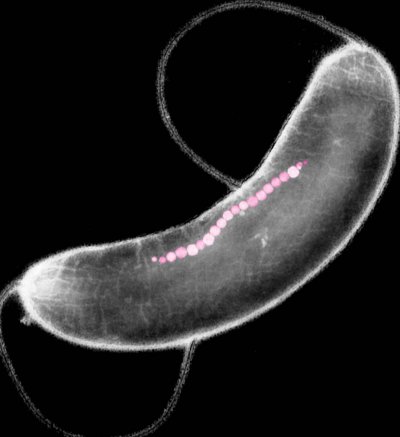 Magnetotactic Bacteria from Mars?
Magnetotactic Bacteria from Mars?
I read the papers. No, I mean the peer-reviewed scientific papers. The upshot is this. In 1984 we discovered a meteorite in Antarctica and proved it was from Mars. In 1996 a group of scientists released a paper claiming that there might be evidence for life in that meteorite, most famously in the form of “fossils of bacteria” (I’ll get more technical on that later). It didn’t take long for other scientists to come up with a series of other possible sources for the markers that the first group were claiming as markers of life. Although the work continues, for the last 13 years it has been widely accepted by the public and by many scientists that the markers in the meteorite (ALH 84001) were not formed by bacteria, they were formed by “plain old geology”. No life.
Well, last week that changed (as new science is wont to do). A group of scientists has been looking closer (literally, they’re using better electron microscopes than we had in 1996) at ALH 84001 for the last 13 years, and last month they published a paper claiming that the suggested geologic processes could not have made the formations found in the meteorite. In other words they disproved the disproof of their original hypothesis, which was that there was once life in this rock. Now, and this is very important to note, they do not claim to have found proof of life, or to have found indications of life. They simply claim that the possibility of a “biogenic origin” is once more back on the table. (Last update: 12/1/2009)
Carbonates and Magnetotactic Bacteria
Explaining magnetotactic bacteria would overwhelm this AstroInfo, so I’ll save that for next time. Suffice it to say, there are bacteria that create very pure nano-scale (really-über-tiny) magnetite. When Kathie (K.L. Thomas-Keprta, primary author) and her team examined the magnetite in ALH84001 they found it identical to the magnetites created on Earth by magnetotactic bacteria. Most importantly – it was extremely pure. This magnetite was associate with carbonate grains in the meteorite, and carbonate is an indication of water. If the magnetite had formed from or with the carbonate it wouldn’t have been as pure as it is.
I look forward to reading any rebuttals put forward by scientists who do not see this as evidence of possible ancient bacteria on Mars.
Where’d I Get My Info?
Press Release
Paper 1: Origins of magnetite nanocrystals in Martian meteorite ALH84001 (Peer-Reviewed)
Paper 2: Life on Mars: New Evidence from Martian Meteorites (Invited Paper)
Magnetotactic Bacteria
![]()
~ A l i c e !






Very interesting. I will be looking forward to hearing more about Magnetotacticus martianus. And just in time for our Mars exhibit.
Howard
Interesting. However, they really should have named it magnetotastic bacteria, because that’s just a fun word.
Andrew
Interesting stuff. I’ll have to bring it to our next astrobiology journal club meeting.
I just read the review paper by Safarik(2002) where he has talked about the mars magnetic particle find and how it could probably even lead us to assume that life might have originated in mars and transferred to earth via meteorites! Very interesting indeed.